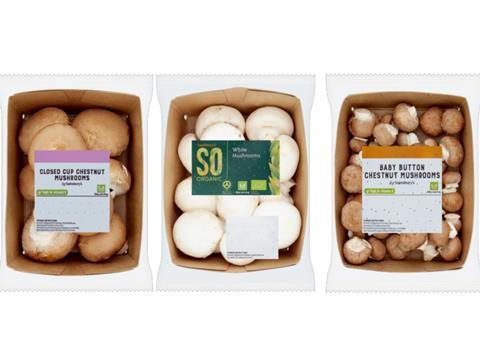
Sainsbury’s is repackaging its own-brand mushrooms in cardboard punnets, which is set to remove enough plastics from its operations to match the weight of 43 full double-decker buses in London.
As such, it is said to be the retailer’s largest undertaking to date when it comes to eliminating plastics – and is expected to make Sainsbury’s the first UK retailer to transition into cardboard for all its own-brand mushrooms. The move is thought to save over 775 tons of plastic, which is the equivalent of over 52 million pieces of plastic every year.
By transitioning into cardboard punnets, Sainsbury’s hopes to help its consumers reduce their plastic intake and recycle their packaging at home. Currently, its bySainsbury’s and SO Organic mushrooms are available in cardboard punnets, with its Taste the Difference lines to be incorporated by the end of January.
The change will apply to all thirteen own-brand lines by the end of the month, including its whole baby button, closed cup, organic, and chestnut mushrooms. Until then, Sainsbury’s highlights that the plastic film packaging can still be taken to its front-of-store flexible plastics recycling points to be recycled.
“As part of our Plan for Better commitments, we are trying to reduce plastic packaging across our own brand ranges,” said Claire Hughes, director of Product and Innovation. “We are delighted to introduce cardboard punnets for our own-brand mushrooms.
“Making a collective effort with suppliers to increasing recycled content and recyclability for all customers has helped achieve our biggest ever plastics removal so far. The initiative reflects our commitment towards a healthier and more sustainable future as we continue to look at ways to innovate our packaging and reduce and replace plastic where possible.”
The development comes after Sainsbury’s rolled out recyclable paper packaging across its own-brand toilet paper and kitchen towel range in the hopes of saving 55 million pieces of plastic annually.
On the other hand, the retailer’s decision to vacuum pack its beef mince range – an effort to save 450 tonnes of plastic every year – was widely criticized by consumers. The ‘awful’ new packaging was accused of being harder to recycle and impacting the quality of the meat inside the pack.
In other news, Panvita Group is adopting the DS Smith Easy Bowl corrugated cardboard tray in a bid to lower plastic consumption across the Ave meat product line by over 1.6 million pieces of packaging every year.
If you liked this article, you might also enjoy:
The L’Oréal approach to packaging sustainability
The way we talk about plastic needs to change – here’s how to get it right
What steps is Apple taking to make its packaging more sustainable?











No comments yet